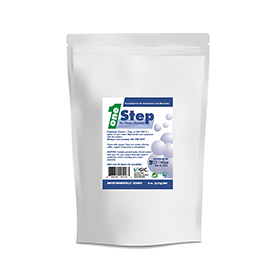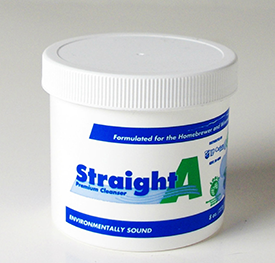Don't Use Specialized Cleaners? It Might Explain the Off Flavors in Your Beer and Wine
Posted by Matteo Lahm on 12th Mar 2025
You’ve got all the best ingredients to make your wine and beer, but there's one thing you might be overlooking - the cleaners specifically designed for your beer and winemaking equipment. Now, you might be thinking, "Cleaners? Why should I care about cleaners? I've got my regular dish soap, isn't that enough?" The short, and correct answer is no.
These specialized cleaners are a breed apart from your everyday, garden-variety detergents. Dish soaps and detergents are used to get your glasses, plates, pots, and utensils clean, and one very important detail is that none of these household items are used for long-term beverage storage. You don’t leave food on a plate for months and let it age. You use it once,wash it, and then use it again. Your beer and wine equipment are used in an entirely different fashion, and it is critical that there are no residues on that equipment that can compromise your creations.
 A carboy containing beer or wine can sit for months at room temperature. If there are perfumed residues, those flavors will be absorbed. Do you want your beer to taste like dish soap? Of course, you don’t! Soap residue is an unseen enemy. It's the remnants of your last brew, the stubborn proteins, the clingy hop oils, the tannins that just won't let go. These residues can stick to your equipment, hiding in the nooks and crannies, waiting to interfere with your next brew. And that's where these specialized cleaners come in. They are designed to wage war on these residues, breaking them down and washing them away, leaving your equipment pristine and ready for your next brewing adventure.
A carboy containing beer or wine can sit for months at room temperature. If there are perfumed residues, those flavors will be absorbed. Do you want your beer to taste like dish soap? Of course, you don’t! Soap residue is an unseen enemy. It's the remnants of your last brew, the stubborn proteins, the clingy hop oils, the tannins that just won't let go. These residues can stick to your equipment, hiding in the nooks and crannies, waiting to interfere with your next brew. And that's where these specialized cleaners come in. They are designed to wage war on these residues, breaking them down and washing them away, leaving your equipment pristine and ready for your next brewing adventure.
Unlike your regular soaps, these cleaners are the strong, silent type. They don't make a big fuss with a lot of foam. Instead, they get down to business, cleaning your equipment thoroughly, and then rinsing away cleanly. They leave no trace behind, not a hint of residue or a whisper of scent. This is crucial in brewing, where even the slightest contamination can throw off the delicate balance of flavors in your beer or wine. This is one of the key differences between these specialized cleaners and regular soaps. Regular soaps often contain perfumes and other additives that can leave behind a residue, potentially affecting the taste of your brew. But with these specialized cleaners, you can rest easy knowing that the only flavors in your beer or wine are the ones you put there.
And let's not forget about safety. These cleaners are made with ingredients that are safe for food contact surfaces. Thus far, we have drawn comparisons with dish soap, but there is also the issue of bleach or other non-food cleaners that should NEVER be used. Bleach especially leaves behind residues and aromas that are very hard to eliminate. Bleach is not on the list of flavor and aroma subtleties of beer and wine.
So, in the grand scheme of your brewing process, these specialized cleaners may seem like a small detail. But as any seasoned brewer will tell you, it's the small details that make the difference between a good brew and a great one. As for the magician behind the curtain, the creation of these specialized cleaners is indeed a fascinating process. It's not as simple as tossing a handful of this and a dash of that into a cauldron. No, these cleaners are the result of careful formulation, rigorous testing, and a deep understanding of the brewing process.
Let's start with the formulation. The active ingredients in these cleaners are often a combination of alkaline salts, chelating agents, and surfactants. Alkaline salts, such as sodium hydroxide or potassium hydroxide, are powerful cleaning agents that can break down organic materials like proteins and hop resins. They work by breaking the bonds that hold these materials together, allowing them to be washed away.
 Chelating agents, such as EDTA or citric acid, are another key component. They have the ability to bind to minerals, such as calcium and magnesium, that are often found in water and can build up on brewing equipment. By binding to these minerals, chelating agents prevent them from interfering with the cleaning process and help to ensure a thorough clean.
Chelating agents, such as EDTA or citric acid, are another key component. They have the ability to bind to minerals, such as calcium and magnesium, that are often found in water and can build up on brewing equipment. By binding to these minerals, chelating agents prevent them from interfering with the cleaning process and help to ensure a thorough clean.
Surfactants, or surface-active agents, are the third piece of the puzzle. They reduce the surface tension of water, allowing it to better penetrate and clean surfaces. Surfactants also help to lift and remove dirt and oils, ensuring they can be easily rinsed away.
These ingredients are carefully balanced to create a cleaner that is effective against the types of residues commonly found in brewing equipment. Proteins from malt, hop resins from your favorite hops, and tannins from your wine grapes can all cling stubbornly to your equipment. But the alkaline salts, chelating agents, and surfactants in these specialized cleaners work together to break down and remove these residues, leaving your equipment sparkling clean.
But the process doesn't stop at formulation. Once a cleaner has been developed, it undergoes rigorous testing to ensure it is effective and safe to use. This can involve testing the cleaner on different types of equipment and materials, as well as testing it against different types of residues. Only once a cleaner has proven its mettle in these tests can it be considered ready for your brewing kit.
So, you see, the creation of these specialized cleaners is a science in itself, a testament to the dedication and expertise of those who understand just how important a clean brew is to you. So why should you, the home brewer, use these specialized cleaners instead of your regular dish soap? Well, think of it this way. You wouldn't use a hammer to fix a watch, would you? The same principle applies here. Regular soaps are great for cleaning dishes, but they're not designed to tackle the unique challenges presented by beer and wine-making equipment.
Using the right cleaner for the job ensures that your equipment is truly clean, free from any residues that could interfere with the brewing process. It's like giving your beer or wine the best possible start in life.
So next time you're brewing up a batch of your famous IPA or crafting a bottle of your signature Merlot, don't forget about the understated sages of the beer and winemaking world - the specialized cleaners that keep your equipment in tip-top shape. Because a clean brew is a happy brew, and a happy brew makes for a happy brewer. Cheers to that!
View All Blog Posts

